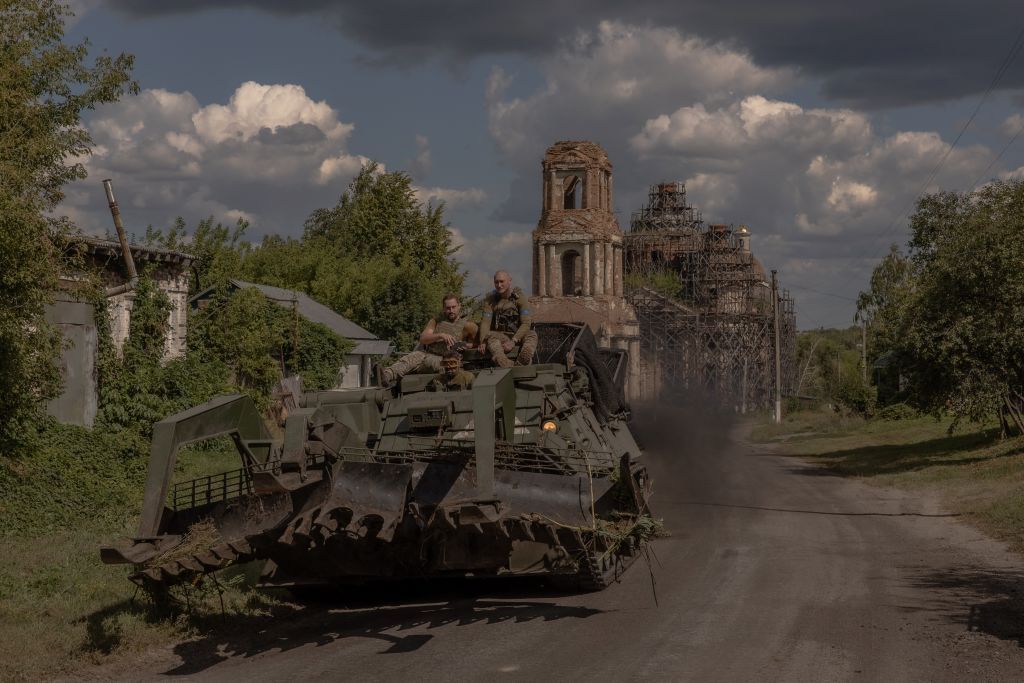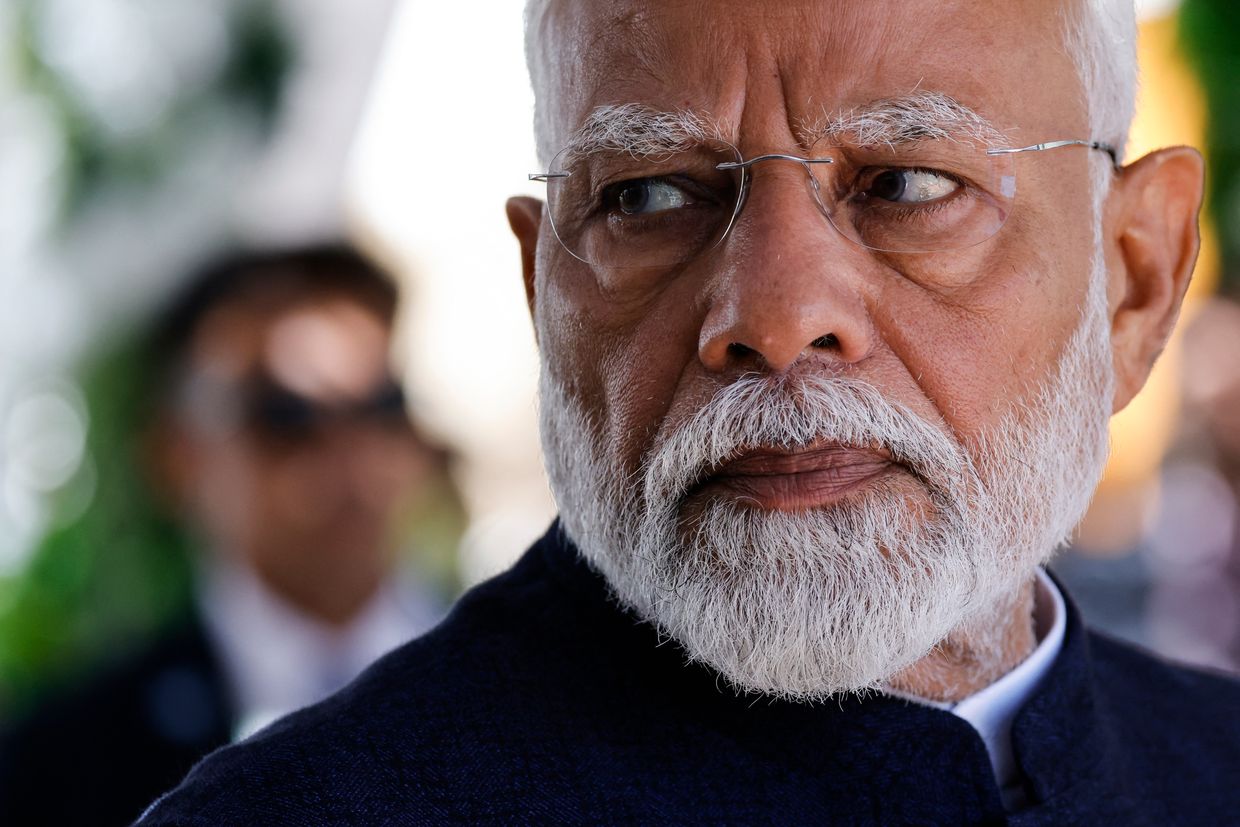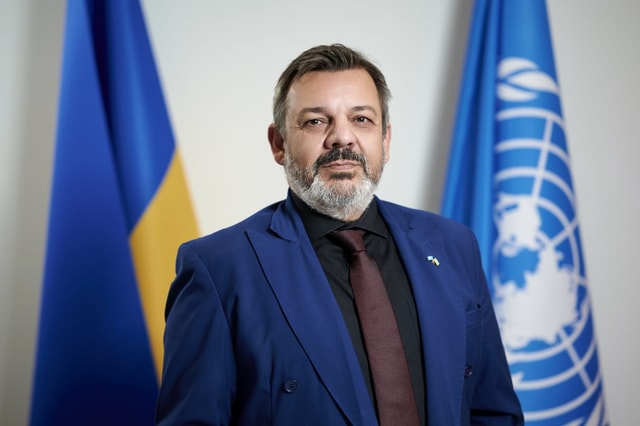Opinion: The hidden toll of Ukraine’s aid workers demands recognition on World Humanitarian Day
On World Humanitarian Day, we pay tribute to Ukraine's dedicated aid workers, who continue their vital mission despite overwhelming dangers.

Local residents queue for humanitarian aid in Borova, Kharkiv Oblast, Ukraine, on Oct. 7, 2022. (Anatolii Stepanov / AFP via Getty Images)

Massimo Diana
UNFPA Representative in Ukraine
On Aug. 14, two humanitarian workers died in a Kherson hospital after being injured by Russian shelling, a stark reminder of the ongoing attacks across Ukraine. As we observe World Humanitarian Day, it's crucial to acknowledge the immense physical and emotional challenges faced by Ukraine’s front-line humanitarian workers.
Humanitarian workers take on significant personal risks to serve the broader community. While the government focuses on the war effort and essential services, they address often-overlooked areas, such as mental health and gender-based violence (GBV) support, particularly for women and girls.
Since Russia’s full-scale invasion began in February 2022, these workers – ranging from medics and psychologists to logistical coordinators – have been pushed to their limits. Operating under constant threat, they provide essential services in some of the most dangerous conditions, including daily shelling and attacks.
Humanitarian workers across Ukraine face daily challenges that test their resilience. Medics like Oksana, who works at the Disaster Medicine Center in Kharkiv, are often stretched thin, performing duties far beyond their specializations. Oksana not only provides medical care but also manages logistics for mobile gynecological teams.
“It is often challenging for our medical staff to reach target settlements because the roads are damaged due to shelling and military equipment movement,” she explained.
All front-line workers, regardless of their role, are exposed to immense stress and danger. The number of incidents impacting humanitarian assistance in Ukraine has risen sharply – 62 in 2022, 228 in 2023, and 154 in 2024 so far. Tragically, this increase has also led to more casualties. Since the full-scale invasion began, 24 aid workers have been killed, 18 of them in the line of duty. Additionally, 67 workers have been injured, most occurring in 2023.
The psychological toll of this violence is severe, not just for the targeted communities but also for the humanitarian workers themselves. Olena Kuznietsova, a psychologist with mobile psychosocial support teams in Kharkiv, often finds herself in life-threatening situations. In one particularly traumatic incident, she was accompanying a GBV survivor to a domestic violence shelter when an airstrike hit a nearby factory. Olena and her team had to calm the woman down while managing their own shock and panic.
This has led to another significant issue: burnout. Continuous exposure to violence, long hours, and the emotional burden of helping GBV survivors and others have caused widespread exhaustion among humanitarian workers. With the war dragging on for more than two and a half years, the demands on these workers continue to grow. Many are reaching their breaking point, and the quality of care they can provide is inevitably affected when they are stretched too thin.
This fatigue and reduced capacity come at a time when the demand for humanitarian aid is more urgent than ever. The war has exacerbated GBV and mental health issues. Men returning from the front lines often bring undiagnosed psychological conditions, leading to increased domestic violence. The instability of war has created a breeding ground for exploitation, sexual violence, and trafficking. Prioritizing mental health care and GBV response is essential for Ukraine’s long-term recovery, even as the war continues.
The war has also severely impacted maternal and child health. The stress and trauma caused by continuous shelling have led to more complications during childbirth and an increase in premature births. Pregnant women in conflict zones face the dual threats of physical danger from violence and the emotional stress accompanying it. UNFPA teams have reported a significant rise in stress-related complications that endanger both mothers and babies.
The need for specialized care in these situations is greater than ever, but providing that care is becoming increasingly difficult and expensive as medical infrastructure is destroyed or severely damaged. Continuous attacks on power grids, water supplies, and transportation networks have forced aid organizations to rely heavily on generators, significantly increasing the cost of delivering aid.
Resources that could help more people are instead diverted to maintaining basic services. For instance, in 2024 alone, there have been 43 incidents involving damage to humanitarian property, including warehouses and distribution points. The lack of reliable power and clean water worsens the already dire conditions for those living in conflict zones.
As the population's needs continue to rise, the role of front-line humanitarian workers is critical. They provide immediate relief and help rebuild the social fabric of communities torn apart by war. UNFPA is increasing training and psychological support for frontline workers, often serving as the only lifeline for those in the most vulnerable situations. Their work is vital to the country’s long-term recovery, but they cannot do it alone. The international community must recognize the immense difficulties these workers face and provide the necessary assistance to sustain their efforts.
Russia’s war in Ukraine is far from over, and the challenges ahead are immense. Yet our front-line workers persevere despite the hardships. Our responsibility is to ensure they have the protections, resources, and support needed to continue this essential work. They are not just responding to a crisis – they are laying the groundwork for a future where the people of Ukraine can live in peace and security.
Editor’s Note: The opinions expressed in the op-ed section are those of the author and do not purport to reflect the views of the Kyiv Independent.













